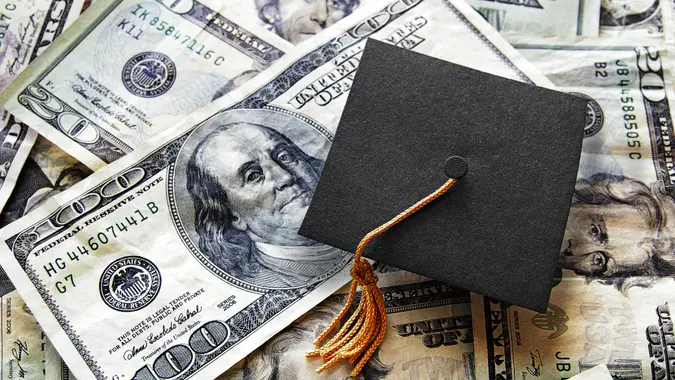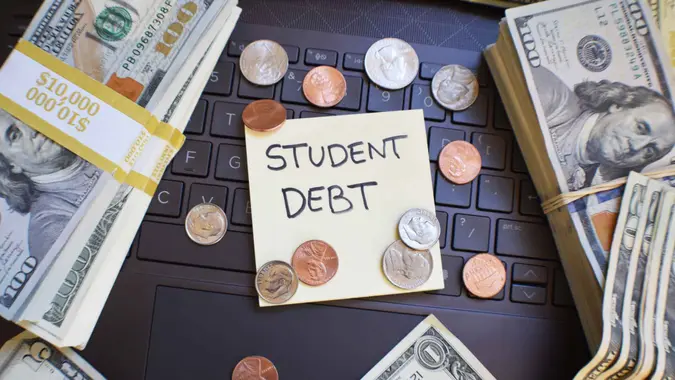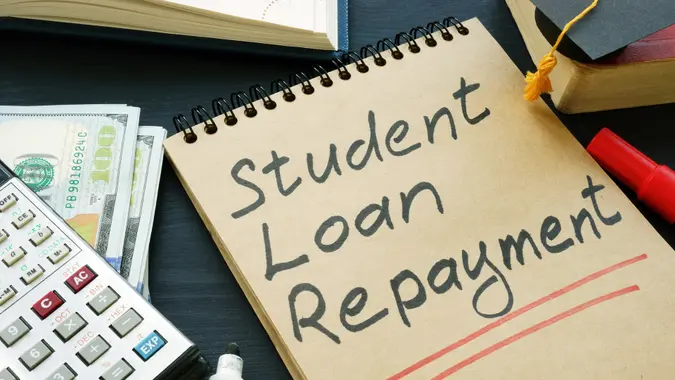Robert Kiyosaki: 3 Best Ways To Rid Yourself of Student Loan Debt

Commitment to Our Readers
GOBankingRates' editorial team is committed to bringing you unbiased reviews and information. We use data-driven methodologies to evaluate financial products and services - our reviews and ratings are not influenced by advertisers. You can read more about our editorial guidelines and our products and services review methodology.

20 Years
Helping You Live Richer

Reviewed
by Experts

Trusted by
Millions of Readers
After three and half years, the federal student loan repayment pause has come to an end. Loan balances started accruing interest on Sept. 1 and, unless you’ve just graduated or are currently in your loan grace period, payments are due this month.
As millions of Americans figure out their payment schedules, the restart will place many of them in a vulnerable position as they struggle to pay their bills. Luckily, there is no shortage of expert opinions on what you can do to rid yourself of student loan debt.
Placing blame squarely at the feet of former President Barack Obama and current President Joe Biden, Japanese-American businessman and “Rich Dad Poor Dad” author Robert Kiyosaki claims the government is largely responsible for the current student loan crisis and the rising cost of education in America.
Talking with his wife, Kim, and guest Laine Schoneberger (CIO and managing partner of student loan lender Yrefy) on his Rich Man Channel on YouTube, Kiyosaki explained the problem with burdening students with exorbitant tuitions and offering little help to pay for them. The ongoing student loan situation is something he calls “criminal.”
“If you were a professional investor, you would not sign up for a student loan,” Kiyosaki said. “They’re the most onerous, the most horrible loans possible. We have a $1.78 trillion problem carried on the shoulders of our students.”
Generating Cash Flow
Graduates this year have an average of just over $37,000 in student debt each, according to Mark Kantrowitz, student loan and financial aid expert. While many financial advisors suggest sticking to budgets, saving, overpaying on debt when you can and avoiding extending loan terms, Kiyosaki urged borrowers to think outside the box.
Speaking to USA Today back in 2016, Kiyosaki recommended students steadily generate cash flow and assets before the question of where to find money to pay off student loans comes up in the first place.
“Cash flow from assets can cover their expenses, liabilities (including debt accrued during college) and help graduates continue to grow their asset portfolio,” said Kiyosaki. “Assets could include a real estate rental property, stocks that pay dividends, or a business venture that delivers positive cash flow each month.”
Investing in Yourself
Of course, building a cash flow cache is easier said than done, especially for students. However, if used to build a cash flow system and make passive money, Kiyosaki believes that some debt could be good. If you are unable to find the funds to generate cash flow, you can still invest in yourself.
The thinking here is that if you have pre-existing financial knowledge at hand and can at least start investing funds, you’ll place yourself in a position to deal with any loan debt down the road.
“Our minds are our greatest assets, and I recommend that in addition to paying down debt they set aside some money for books or classes on topics that interest them such as investing, real estate, the economy and business,” said Kiyosaki. “These small investments now will pay dividends for years to come and can deliver a better long-term return than aggressively paying down debt.”
Find: New Student Loan Forgiveness Rule Simplifies Process — Who Qualifies?
Renegotiating With Private Lenders
Investing in cash flow opportunities and in yourself are great approaches in theory, but tough to pull off in reality. The main reason for having Schoneberger on Kiyosaki’s channel as a guest was to highlight the possibility and future of students using an independent lender, like Yrefy, to renegotiate private student loans — as well as to gesture toward the possibility of investors receiving higher returns on their money than anywhere else.
Using factors besides credit scores to determine interest rates, Yrefy helps borrowers refinance delinquent and defaulted private student loans by offering reduced loan balances, low fixed interest rates and custom terms.
With a good majority of student loans directly falling under the Department of Education’s authority and all proposed federal loan forgiveness programs getting stymied at every turn, it will be interesting to see if private companies like Yrefy can reel in the unmanageable student debt plaguing America, help borrowers’ credit scores and improve their financial opportunities.
 Written by
Written by  Edited by
Edited by 
























